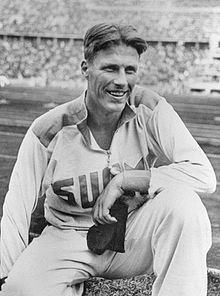Gunnar Höckert
 Gunnar Höckert at the 1936 Olympics | ||||||||||||
| Personal information | ||||||||||||
|---|---|---|---|---|---|---|---|---|---|---|---|---|
| Born | 12 February 1910 Helsinki, Finland | |||||||||||
| Died | 11 February 1940 (aged 29) Karelian Isthmus, Russia | |||||||||||
| Height | 1.78 m (5 ft 10 in) | |||||||||||
| Weight | 67–69 kg (148–152 lb) | |||||||||||
| Sport | ||||||||||||
| Sport | Athletics | |||||||||||
| Event(s) | 1500 m, 5000 m, steeplechase | |||||||||||
| Club | Idrottsklubben 32, Helsinki | |||||||||||
| Achievements and titles | ||||||||||||
| Personal best(s) | 1500 – 3:55.2 (1936) 3000 mS – 9:26.8 (1935) 5000 m – 14:22.2 (1936)[1][2] | |||||||||||
Medal record
| ||||||||||||
Gunnar Mikael Höckert (12 February 1910 – 11 February 1940) was a Finnish runner, winner of the 5000 m race at the 1936 Summer Olympics.
Biography
Born in Helsinki to a wealthy family, Gunnar Höckert had only one great season, in 1936. The 5000 m final at the Berlin Olympics started in a good pace. The tempo was dictated by American Donald Lash, but he was overtaken by three Finns after 2,000 m. Soon the race turned into a battle between Höckert and defending Olympic Champion and world record holder Lauri Lehtinen. In the last lap Höckert overran Lehtinen to win in a world's season best time of 14:22.2. In this same race Gunnar's teammate Henry Jonsson got third place over Kohei Murakoso, Japanese runner who was leading the race at the beginning.[1]
Later on that season, on 16 September in Stockholm, Höckert ran a new world record in 3,000 m (8:14.8). A week later, on the same track, Höckert ran a new world record in 2 miles (8:57.4) and another week later, he equalled the Jules Ladoumegue's 2,000 m world record of 5:21.8 in Malmö.[1]
The rest of the Höckert's athletics career was hampered by rheumatism, and he never again achieved the times he had run in 1936. He went to the Winter War as a volunteer, progressing to 2nd lieutenant. He was killed on the Karelian Isthmus, just one day before his thirtieth birthday.[3]
References
- ^ a b c Gunnar Höckert. sports-reference.com
- ^ Gunnar Höckert. trackfield.brinkster.net
- ^ Wallechinsky, David (2004). The Complete Book of the Summer Olympics, Toronto: Sport Classic Books. ISBN 1-894963-34-2
- 1910 births
- 1940 deaths
- Sportspeople from Helsinki
- People from Uusimaa Province (Grand Duchy of Finland)
- Swedish-speaking Finns
- Finnish male middle-distance runners
- Finnish male long-distance runners
- Finnish male steeplechase runners
- Olympic athletes of Finland
- Athletes (track and field) at the 1936 Summer Olympics
- Olympic gold medalists for Finland
- Former world record holders in athletics (track and field)
- Finnish military personnel killed in World War II
- Medalists at the 1936 Summer Olympics
- Olympic gold medalists in athletics (track and field)
